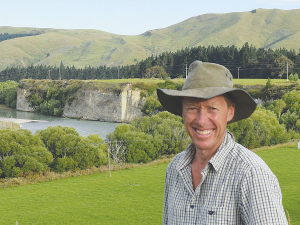94% of NZ farmers oppose Paris Agreement, survey shows
A survey of 2000 farmers shows 94% of respondents believe that remaining in the Paris Agreement for climate change is not in the country's best interest.
 Jamie McFadden believes the Government's policy on FEPs is unprecedented state control over ordinary citizens.
Jamie McFadden believes the Government's policy on FEPs is unprecedented state control over ordinary citizens.
Rural Advocacy Network chairman Jamie McFadden was a key speaker at the recent round of Groundswell NZ meetings. He spoke about the push for Farm Environment Plans (FEPs) and why these may not be the great cure-all many are claiming. Here is an edited version of the speech...
There are many different approaches to farm plans.
Taranaki Regional Council has, over the past 25 years, continued the catchment board approach to voluntary farm plans working in partnership with farmers. In Canterbury, ECan has taken a one-size-fits-all, tick box regulatory approach to farm plans. There are also a myriad of industry farm plan templates. An actions-focused, empowering farm plan is very different to the one the Government is mandating through the Resource Management Act (RMA).
Under New Zealand law we are supposed to be protected from unjustified state control. The Government is enforcing mandatory, certified, audited FEPs on every farmer - regardless of whether there is a freshwater issue in your catchment or whether your activity is having more than minor effect on the environment.
The only group of people being subject to mandatory environment plans are farmers. If the Government were being consistent then they would require everyone (including urban landowners) to do an Environment Plan as we all affect freshwater. But imagine the howls of protest against state control.
The Government claims that farmers need to do these FEPs to reassure our overseas markets. However, the RMA is related to environmental effects, not issues of market assurance. The Government is using this argument because it insufficient justification under the RMA.
Market assurance should be progressed through out industry and exporters, which is already happening with meat companies, Fonterra and industry groups.
The Government has attempted to sell their mandatory FEP policy with a $50 million sweetener and the promise (just prior to the election) of reducing compliance for every farmer. This misleading claim of reducing compliance ignores some facts.
A market assurance farm plan through your meat or milk company or industry group like Beef+Lamb NZ is confidential. None of your private property information is available to the public unless you require a consent or get caught in a compliance issue or for mapping the likes of Significant Natural Area's (SNA), but it is only information related to that specific issue.
However, when an FEP becomes compliance under the RMA it becomes public information. So, all that information on a dryland farm that was previously not accessible to the public now becomes public.
This represents a major breach of people's privacy rights.
It is for all these reasons we should reject the Government's legislation on RMA-mandated FEPs and call on all farmers to refuse to comply until such time the issues outlined above are resolved.
Budou are being picked now in Bridge Pā, the most intense and exciting time of the year for the Greencollar team – and the harvest of the finest eating grapes is weeks earlier than expected.
The Real Estate Institute of New Zealand (REINZ) has released its latest rural property report, providing a detailed view of New Zealand’s rural real estate market for the 12 months ending December 2025.
Rural retailer Farmlands has released it's latest round of half-year results, labeling it as evidence that its five-year strategy is delivering on financial performance and better value for members.
OPINION: "We are back to where we were a year ago," according to a leading banking analyst in the UK, referring to US president Donald Trump's latest imposition of a global 10% tariff on all exports into the US.
DairyNZ says the Government’s proposed Resource Management Act reform needs further work to ensure it delivers on its intent.
Overseas Trade Minister Todd McClay says he's working constructively with the Labour Party in the hope they will endorse the free trade agreement (FTA) with India when the agreement comes before Parliament for ratification.